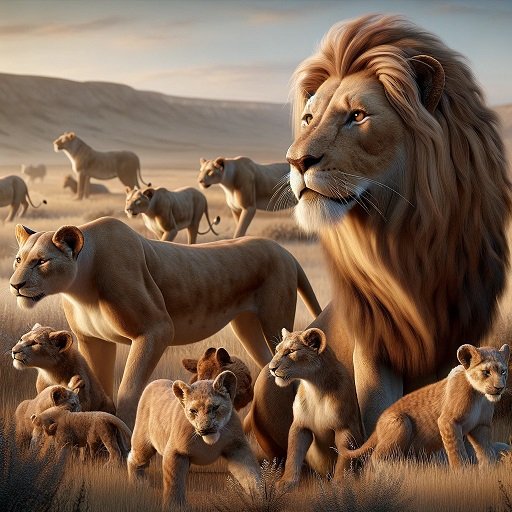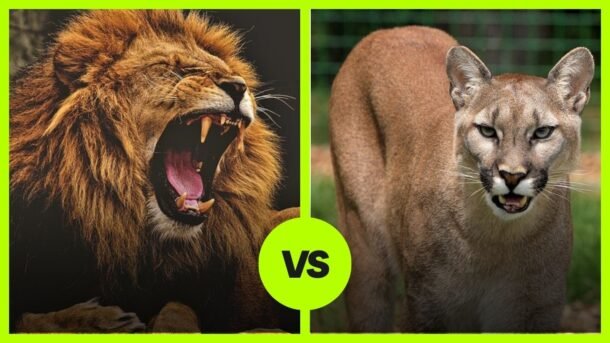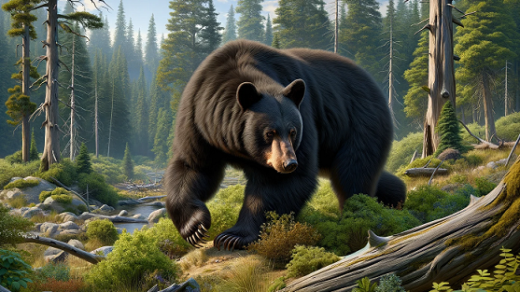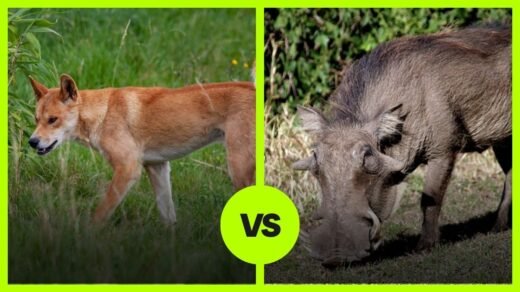Introduction
In the grand arena of nature’s most impressive predators, the African Lion and the Cougar stand out as two of the most formidable big cats. This face-off is akin to an international heavyweight boxing match, but with claws and fangs. Let’s dive into the details of these two apex predators and assess who would reign supreme in this hypothetical battle.
The Competitors: Savannah Monarch vs. Mountain Ghost
African Lion: The Savannah’s Sovereign
The African Lion, often referred to as the King of the African savannah, is a symbol of power and majesty. Male lions, weighing between 300-500 pounds, are not just muscular but also strategically intelligent. Their manes aren’t merely for show; they serve as a form of protection during skirmishes and as a symbol of their dominance.
Cougar: The Stealthy Mountain Ghost
The Cougar, also known as the mountain lion or puma, is a master of the American wilderness. These cats, with adult males weighing between 115-220 pounds, are smaller than their African counterparts. However, what they lack in size, they compensate for with agility, stealth, and remarkable hunting skills.
Hunting Strategies and Adaptations
African Lion: Teamwork in the Hunt
African Lions, as apex predators, showcase a remarkable range of prey, which highlights their versatility and adaptability in the African savannah. Their diet primarily includes large ungulates such as wildebeest, zebras, and various species of antelope, including impalas and kudus. They are also known to hunt larger prey like buffaloes, giraffes, and occasionally young elephants, rhinos, and hippos.

Lions employ a coordinated hunting strategy that leverages the strengths of the pride. Lionesses, often smaller and more agile, play a crucial role in the hunt. They collaborate to stalk their prey, using the tall grasses and terrain for camouflage. The hunt typically involves encircling the target, with some members of the pride driving the prey towards the ambushers. This tactic demonstrates not just their physical prowess but also their high level of tactical intelligence. The final charge is explosive and powerful, designed to bring down the prey swiftly, often targeting the vulnerable neck and throat areas.
Cougar: Solitary Ambush Specialist
Cougars, on the other hand, have a diverse diet that reflects their wide geographic range across the Americas. Their primary prey includes deer species such as white-tailed deer, mule deer, and even larger animals like elk and moose. Cougars also hunt smaller mammals when larger prey is scarce. This includes rabbits, beavers, porcupines, raccoons, and occasionally livestock or pets in areas close to human habitation.

The hunting technique of a cougar is a masterclass in stealth and precision. As solitary hunters, they rely on their camouflaged fur and the element of surprise to get close to their prey. They typically stalk their target from a distance, using natural cover, and then execute a swift and powerful leap. Their strong hind legs enable them to make leaps of up to 40 feet horizontally and 15 feet vertically. The cougar aims to deliver a fatal bite, usually at the back of the neck or the throat, to incapacitate their prey quickly and efficiently. This method minimizes the risk of injury to the cougar and ensures a high success rate in their hunts.
In summary, the African Lion and Cougar exhibit distinct hunting strategies that have evolved to suit their environments and available prey. While lions in the savannah use teamwork and brute strength to take down large ungulates, cougars employ stealth and agility to ambush a variety of prey across diverse terrains. These hunting methods are not just about physical capabilities; they also reflect the cognitive adaptations of these magnificent predators.
Comparative Advantages
Lion’s Arsenal: Sheer Force and Group Dynamics
The African Lion’s primary advantage lies in its size and brute strength, essential in one-on-one confrontations. Their experience in group hunting and fighting could provide a tactical edge, even in a solitary battle.
The Battlefield: An Open Savannah with Strategic Cover
Imagining an open savannah with scattered trees and rocks offers a balanced battleground. This terrain provides the Cougar with some cover and ambush points, while the Lion can utilize its stalking prowess and strength.
The Showdown: Evaluating the Odds
When breaking down the potential outcome:
- African Lion: 85% chance of victory. The Lion’s size, strength, and mane, providing defense against neck injuries, give it a significant advantage.
- Cougar: 15% chance of victory. The Cougar’s agility and stealth tactics could offer some defense, allowing it to evade the Lion temporarily. However, in a direct confrontation, the odds lean heavily in favor of the Lion.
Conclusion: A Battle of Giants
In this hypothetical clash between the African Lion and the Cougar, the scales tip in favor of the Lion, thanks to its superior size and strength. However, the Cougar’s agility and stealth should not be underestimated, as they represent the pinnacle of predatory evolution in their respective domains. This matchup is more than a mere fight; it’s a showcase of nature’s diverse adaptations and survival strategies.
For readers interested in exploring more about the fascinating world of animal comparisons, here are three articles from our website that complement the theme of lions and cougars:
- Dive into the dynamics of size and strategy in “Lion vs. Rhino: Who Would Win?”, an intriguing exploration of a confrontation between the king of the savannah and the armored giant.
- Discover how two top predators fare in different terrains in “Wolf vs. Cougar: A Battle of North American Predators”, comparing the hunting styles and survival tactics of these formidable animals.
- Explore a unique matchup in the African wilderness with “Lion vs. Elephant: Who Would Win?”, offering insight into the power play between these two giants of the animal kingdom.




